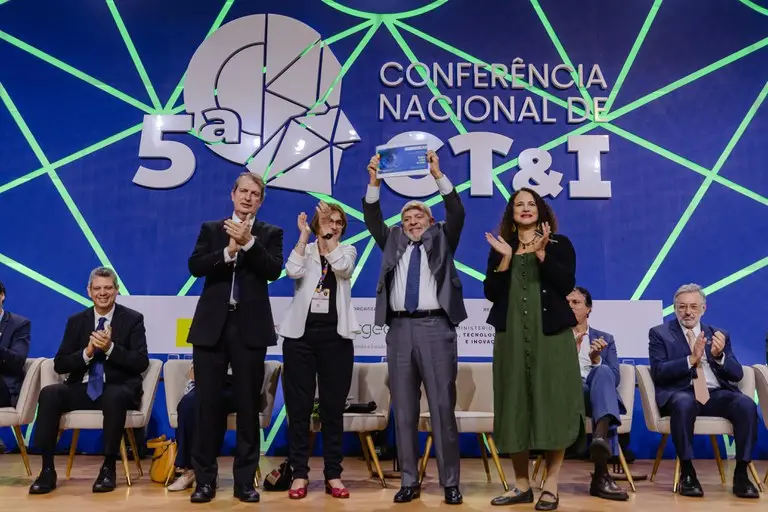
Published: 07/30/2024
Content:
President of the Republic Luiz Inácio Lula da Silva received on Tuesday the proposal for the first Brazilian Artificial Intelligence Plan (PBIA). The proposal was delivered during the opening of the 5th National Conference on Science, Technology, and Innovation (5CNCTI) at Espaço Brasil 21, in Brasília. The plan includes the purchase of one of the five most powerful supercomputers in the world and an investment of up to R$ 23 billion over four years. The ceremony was attended by the Minister of Science, Technology, and Innovation, Luciana Santos, and the Secretary-General of the conference, Sérgio Rezende, among other authorities.
Commissioned by Lula to the National Council for Science and Technology (CCT) at the beginning of the year, the PBIA aims to guide the ethical and sustainable development and application of artificial intelligence in Brazil. The plan outlines guidelines for research and development as well as regulations to ensure the safety and privacy of citizens. The R$ 23 billion investment will come from the budget, the National Fund for Scientific and Technological Development (FNDCT), private sector contributions, and other funding sources. The new plan’s proposal can be consulted here.
For Lula, “the proposal from Brazilian scientists is a milestone in our country’s history.” He added, “What you have presented cannot just sit in a drawer. Our artificial intelligence must be intelligent. And we must make it a source to create jobs for our country and train millions of young people prepared for this debate. Brazil needs to learn to fly. We cannot be dependent all our lives; we need to have the courage to make things happen.”
Minister Luciana Santos stated that “the plan is bold and feasible at the same time; it is robust and achievable.” She noted, “It has public investment comparable to that of the European Union. We will come strong and present viable alternatives for Brazil,” before giving an interview to journalists about the PBIA.
The proposal aims to equip Brazil with advanced technological infrastructure with high processing capacity powered by renewable energy, including the new supercomputer. It also aims to develop advanced language models in Portuguese, with national data that encompasses our cultural, social, and linguistic characteristics.
Luciana Santos celebrated the resumption of dialogue and listening to society after a period of denialism in the previous government. According to her, the conference results from the government’s political determination, which reconstituted the FNDCT, allowing a R$ 10 billion investment in 2023, and the dedication of national scientists who conceived the Brazilian Artificial Intelligence Plan.
The PBIA outlines 31 actions in different areas with short-term impacts, aimed at addressing urgent demands in health, education, the environment, agriculture, industry, commerce and services, social development, and public service management.
With the theme “Science, Technology, and Innovation for a Just, Sustainable, and Developed Brazil,” the 5CNCTI, which continues until Thursday (1st), is the main forum for debates about the future of science in the country. The event, held after 14 years, features 320 speakers and will discuss the priorities of public policies in the sector. The 5CNCTI is organized by the MCTI and the CGEE (Center for Management and Strategic Studies), with support from various sector entities and civil society.
The Secretary-General of the 5CNCTI, former Minister of Science and Technology Sergio Rezende, advocated for the creation of a national policy for the Amazon, support for universities, and the creation of new sectoral funds. “It is necessary to increase resources for science, technology, and innovation,” he argued.
The primary goal of the conference is to build the new National Strategy for Science, Technology, and Innovation (ENCTI) by 2030, as per a presidential decree, and to define concrete actions for the coming years.
Participants include government representatives, scientists, entities, and other civil society representatives. Key topics include urgent challenges such as artificial intelligence, climate change, energy transition, new industrialization policy, and science and technology financing. More than 2,200 people attend in person, and another 2,000 virtually in over 50 debate sessions and seven plenaries. In addition to Lula and Minister Luciana Santos, other state ministers will participate in the conference in the coming days. Minister Marina Silva (Environment) will discuss “opportunities and challenges for sustainable and inclusive development”; Nísia Trindade (Health) will address the health industrial complex; and Camilo Santana (Education) will highlight the debate on the present and future of universities. Ministers Flávio Dino (Supreme Federal Court) and Jorge Messias (Attorney General’s Office) will also participate.
Preparatory Events for 5CNCTI Attracted Over 100,000 People
Organized by the MCTI and the CGEE, with support from sector entities and civil society, the 5CNCTI held 221 preparatory events over the past six months, attended by over 100,000 people. These included regional, state, municipal, free, and thematic conferences, gathering proposals for the new Science and Technology Strategy. This is a record number in the event’s history, which has had four previous editions.
Service Information: 5th National Conference on Science, Technology, and Innovation Dates: July 30 and 31, August 1